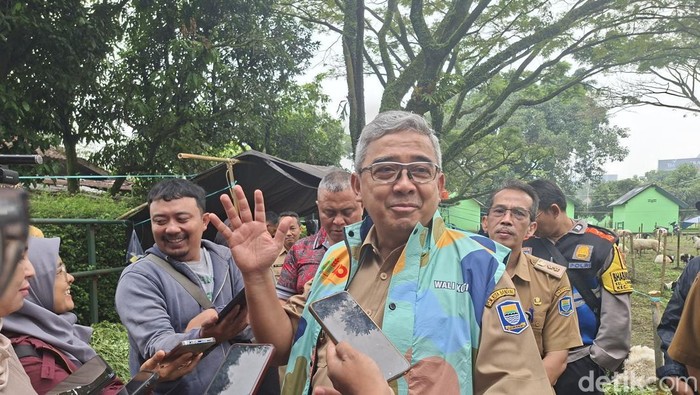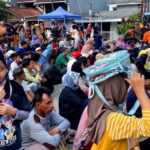Bandung —
Ahead of Eid al-Adha celebrations, the Bandung city authorities conducted health inspections of sacrificial animals at various sales locations. Currently, 70 percent of all sacrificial animals in Bandung have been deemed fit for slaughter.
The remaining 30 percent were found to be unhealthy for various reasons, including being underage. In total, nearly 10,000 sacrificial animals have arrived in Bandung so far.
«As of now, nearly 10,000 sacrificial animals have arrived in Bandung. Inspection results show that 30 percent are unhealthy, meaning they are underage, as we must follow Sharia guidelines,» said Bandung Mayor Muhammad Farhan while inspecting sales areas in Pussenkafe on Tuesday (03/06/2025).
Meanwhile, the remaining 70 percent, approximately 7,000 animals, have been declared healthy and fit for slaughter. Among all sacrificial animals in Bandung, two-thirds are sheep and goats, while the rest are mostly cows and three buffaloes.
Farhan stated that the inspection process ensures that all animals slaughtered and consumed by the community are healthy. He also anticipates the possibility of contagious diseases among sacrificial animals.
«If even one sacrificial animal is found with a contagious disease, we must conduct a full inspection. Rather than waiting, it’s better to take precautions and inspect beforehand,» Farhan explained.
No Foot-and-Mouth Disease Found in Bandung’s Sacrificial Animals
The Head of Bandung’s Food Security and Agriculture Department (Dispangtan), Gigin Ginajar, stated that 30 percent of sacrificial animals were deemed unfit for several reasons, with the main factor being underage status.
«The requirements for sacrifice include not only health but also suitability. These animals were found unsuitable because they are underage. Some are sold too young, around 20 percent. Fit and healthy animals account for 70 percent,» Gigin explained during an interview in Cicendo on Monday (02/06/2025).
The remaining 10 percent, he said, showed minor health issues. However, he assured that no animals with symptoms of contagious diseases like foot-and-mouth disease have been detected so far.
«The health issues are not due to contagious diseases but minor ailments, as many are sold by the roadside. Some conditions include weather adaptation, improper feeding leading to diarrhea, or eye irritation from wind,» he clarified.
Inspections are ongoing. If sacrificial animals are found with other health issues, such as wounds or loss of appetite, they will be separated for treatment.
«Symptoms like lethargy, reduced appetite, or foot wounds will be immediately identified, isolated, and treated with medication. They will be quarantined and monitored until healthy and fit for sale,» he stated.






